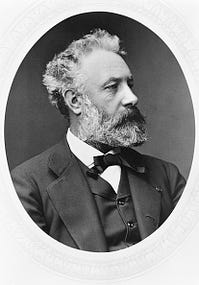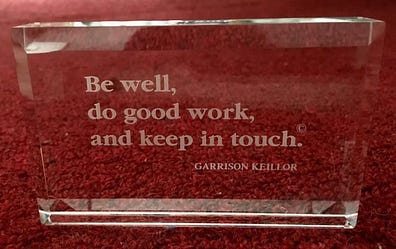|
 |
"Daily I Fall in Love with Mechanics" by Susan Thurston. © Susan Thurston.
ORIGINAL TEXT AND AUDIO - 2011
It's the birthday of John Grisham, born in Jonesboro, Arkansas (1955), the author of novels like The Firm (1991), The Pelican Brief (1992), The Rainmaker (1995), The Runaway Jury (1996), and The Brethren (2000). All of his legal thrillers have been international best-sellers, and there are 250 million of his books in print.
He grew up all over the Deep South. Every time his family moved somewhere new, they'd join the local Southern Baptist church, find the public library, and get new library cards. As a teenager, he watered bushes for $1 an hour, and then he laid chain-link fence for $1.50 an hour. He did plumbing. He worked on an asphalt crew during a July in Mississippi, which he said felt like a sauna. He sold men's underwear at a Sears, which was an improvement in that it was air-conditioned, at least, but he hated the job. All of these jobs made him very serious about going college and finding a desk job.
He settled on being "a high-powered tax lawyer," but then he got to law school and found that he was stunned by the "complexity and lunacy" of tax law. He barely passed that class. But he liked mock trial, so he decided to become, he said, "a hotshot trial lawyer."
He graduated from law school and, in order to get some trial experience quickly, he took on a bunch of low-paying cases. He struggled to pay the bills and dreamed that his big case would arrive. And then, in 1984, it did — though it wasn't exactly his case. He was "loitering around the courtroom, pretending to be busy," he said, and listening in on the trial of a young girl who had been raped. He said, "Her testimony was gut-wrenching, graphic, heartbreaking, and riveting. Every juror was crying. I remember staring at the defendant and wishing I had a gun." He started to think about what would happen if the girl's father murdered the men who had assaulted her. And from that, he said, "a story was born."
For the next three years, he worked on that story, A Time to Kill (1989). He woke up at 5 to work at it each day before going to his law office, and he worked on it during courtroom recesses. He finished it and sent it off. A bunch of publishers rejected it. One finally accepted it but did a print run of just a few thousand copies. In the meantime, he had started to hate being a lawyer, defending criminals and preparing tedious estate documents. He was so unhappy he would dream of ways to get out. And, when he was not at work, he would write fictional stories about lawyers looking for an escape. The day he finished A Time to Kill, he started writing The Firm.
When the film rights to The Firm were bought by a major Hollywood studio, he quit being a lawyer. He said that the day he closed his law office was "the happiest day of [his] life." He said, "It's so much fun to write about lawyers, but I never enjoyed being a lawyer." The Firm spent 47 weeks on The New York Times best-seller list and was the best-selling book of 1991.
He publishes about a novel per year, and it usually takes him six months to complete one. The other six months, he watches baseball and enjoys being on the farm with his wife and kids. In 2009, he published his first book of short stories, Ford County. Last year, he wrote a legal thriller for young adults, Theodore Boone: Kid Lawyer (2010). His most recent novel, The Confession (2010), came out last fall.
It's the birthday of poet Elizabeth Bishop, born in Worcester, Massachusetts (1911). She went to Vassar, where she really began her career as a poet. Her mentor was the poet Marianne Moore, who taught Bishop that she could write poems that weren't about big ideas like love or death, but just about the observation of ordinary things.
Elizabeth Bishop was a slow, meticulous writer — she published just 101 poems during her lifetime.
It's the birthday of the man known as the father of science fiction, Jules Verne, born in Nantes, France (1828). In his adventure novels, Paris in the 20th Century (written 1863, not published until 1994), Journey to the Center of the Earth (1864), and Around the World in Eighty Days (1873), Verne described inventions that were similar to modern airplanes and automobiles, and tall skyscrapers where people use electricity to listen to the radio and send faxes, and yet he wrote his stories by candlelight.
It's the birthday of Kate Chopin, born in St. Louis, Missouri, in 1850. She came from a wealthy family — her father was a successful businessman and her mother was a beautiful socialite from one of the city's oldest Creole families. Kate was a Southern belle, a devoted wife, and the mother of six children.
But then her husband died, and soon after that her mother died. Chopin was depressed. Her family doctor thought she was a very good letter-writer, so he encouraged her to try writing fiction as a way to stay occupied. Over the next 15 years, Kate Chopin wrote almost 100 short stories and sketches, and two novels, At Fault (1890) and The Awakening (1899). The Awakening is the story of Edna Pontellier, who gives up her roles as wife and mother, has an affair, and eventually walks into the sea, perhaps committing suicide. And when it was published, Kate Chopin was censored and criticized. But now she is considered an important early feminist author, and The Awakening is considered a classic of American fiction.
Be well, do good work, and keep in touch.®
The Writer’s Almanac Paperweight
You’re a free subscriber to The Writer's Almanac with Garrison Keillor. Your financial support is used to maintain these newsletters, websites, and archive. Support can be made through our garrisonkeillor.com store, by check to Prairie Home Productions P.O. Box 2090, Minneapolis, MN 55402, or by clicking the SUBSCRIBE button. This financial support is not tax deductible.


